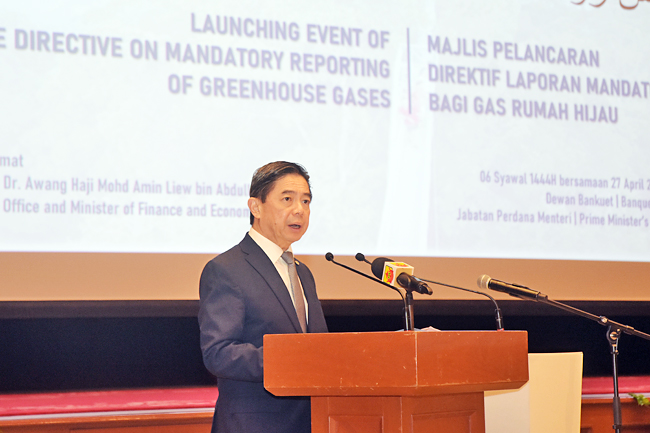James Kon
Brunei Darussalam is not exempt from climate crisis’ effects with an average temperature raise of 0.25 degrees Celsius (˚C) per decade that may reach 4˚C by the end of the century, as well as monthly rainfalls increasing 100 millimetres (mm) per decade to 500mm by 2050.
The concerning trends that may threaten key economic areas in the Sultanate were raised by Minister at the Prime Minister’s Office and Minister of Finance and Economy II Dato Seri Setia Dr Awang Haji Mohd Amin Liew bin Abdullah at the launch of the directive on the mandatory reporting on greenhouse gas at the Prime Minister’s Office building on Jalan Menteri Besar yesterday.
The minister also noted the impacts of climate change on Brunei, such as increased flooding, forest fires, landslides and strong winds that damaged infrastructures, buildings and the environment.
Dato Seri Setia Dr Awang Haji Mohd Amin Liew, the Co-Chair of Brunei Darussalam National Council on Climate Change (BNCCC), also lauded the Sultanate’s strong commitment to combatting climate change.

He said although Brunei’s contribution to overall greenhouse gas (GHG) emissions is low – at only 0.017 per cent annually – the Sultanate is committed to the Paris Agreement and launched the BNCCP in July 2020 to achieve low carbon, climate-resilient and sustainable nation.
The minister said Brunei is also committed to reducing greenhouse gas emissions by 20 per cent by 2030 and Brunei Darussalam National Climate Change Policy (BNCCP) was launched to meet the objective.
Dato Seri Setia Dr Awang Haji Mohd Amin Liew said transparent and robust reporting of greenhouse gas emissions is critical in keeping track of the Sultanate’s progress.
He said accurate and reliable data on the country’s emissions is necessary to support policymaking, assess the effectiveness of efforts and the allocation of resources for climate action.
The minister said mandatory reporting is also a platform for developing a long-term strategy to achieve net zero.
He added that a strong carbon accounting mechanism also builds trust and credibility in the international community as well as demonstrates Brunei’s commitment to taking meaningful actions on climate change, thus enhancing the Sultanate’s position in international negotiations and collaborations on climate issues.




